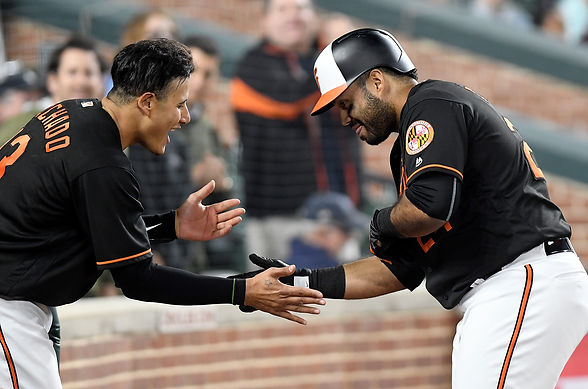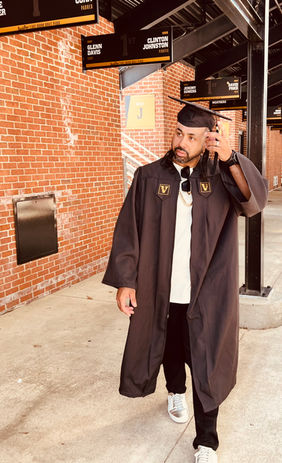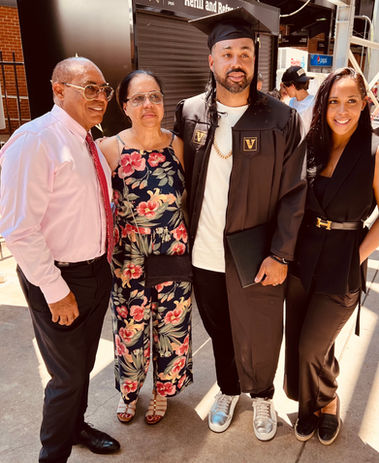
GRADUATION DAY
When hitting baseballs was no longer an option, Pedro Alvarez hit the books
By Jerry Crasnick
Education was always the focus in the Alvarez household. A young Pedro Alvarez received the lecture more than once from his parents, Pedro and Luz, who emigrated from the Dominican Republic to New York when he was one year old in 1988 and never yielded in their expectations.
“My parents kind of ingrained that into our household with me and my sister,’’ Alvarez says. “I would get the speech, ‘If you don't do well in school, you can't play baseball.’ Thankfully, I never had to experience that.’’
The priorities were clear when Alvarez enrolled at the elite Horace Mann School in the Bronx as a teenager and passed on a bonus offer of almost a million dollars from the Boston Red Sox as a 14th round draft pick in 2005 to go to school and play baseball at Vanderbilt University.
And now the academic portion of the story comes full circle, as a prelude to an intriguing second act.
Today, Alvarez swaps his bat and ball for a cap and gown. Fourteen years after leaving Vanderbilt to sign his first professional contract with the Pittsburgh Pirates -- and four years after taking his final big-league at-bat with the Baltimore Orioles -- he graduates from Vandy as a Dean’s list student with a major in Medicine, Health and Society. It’s an emotional time for him, for an abundance of reasons.
“I've been able to do a lot of things on the field,’’ Alvarez says. “Getting that degree is pretty high up there on my list of accomplishments.’’




Alvarez, who joined the Milwaukee Brewers as a baseball operations and player development assistant in February, is one of several former big leaguers to go diploma hunting of late. Rickie Weeks, another recent addition to the Milwaukee front office, graduated from Florida International University with a sports management degree in December. A month later, former big-league outfielder Chris Young received a bachelor’s degree in business administration from Arizona State University.
“Baseball worked out for me, so that kind of took precedence,” Weeks told reporters upon his hiring. “But once I got done playing, my first thought was to go back to school . . . I’ve been wanting to do this since I was a little kid.’’
Alvarez, 35, took an eventful journey to this moment. As a prep player and collegian, he was a prospect darling acclaimed for his bat speed and home run power. He showed enough promise for the Pirates to pick him No. 2 overall in the 2008 draft, shortly before Eric Hosmer, Buster Posey and Yonder Alonso went off the board.
Alvarez hit 66 homers in a two-year span with Pittsburgh early in his career, but he also dealt with injuries, high strikeout totals and the oppressive scrutiny that follows hotshot prospects. He finished his career with 162 homers, a .447 slugging percentage, a Silver Slugger Award and an All-Star Game appearance in 2013.
After suffering a torn Achilles in August 2018, Alvarez spent months trying to rehab the injury before his progress stalled and he reached a plateau. When he signed his first contract with Pittsburgh, his advisor, Scott Boras, had negotiated a scholarship component that allowed him return to school and complete work toward his degree. But the funds came with an expiration date. During the Covid lockdown in 2020, he decided he was ready to make the commitment and re-enrolled at Vanderbilt.
School had always been work for Alvarez, who wasn’t as academically inclined as his younger sister, Yolayna. “If we had to write a 10-page paper, she was probably going to write 12, and I was like, ‘How can I make these eight pages look like 10?’ ” he said. But he had an aptitude for problem solving and a natural curiosity that compelled him to embrace new ideas.
Alvarez majored in economics in his first tour of Vanderbilt and flirted with a 3.0 GPA before switching to Medicine, Health and Society upon his return to school. Among the core classes offered in the MHS major: Politics of Health, Theories of the Body, American Medicine in the World and COVID in Society.
With the support of his wife, Keli, he participated in study groups at night and put in the time and effort to post a 3.9 GPA and raise his cumulative average. He found the classroom experience less stressful than the first time around, when he had to balance schoolwork with batting cleanup for coach Tim Corbin’s Commodores.
“Coach Corbin did a great job emphasizing the importance of time management,’’ Alvarez says. “But you kind of live a double life. School doesn't care about baseball and baseball doesn't care about school, except that your grades affect whether you can play. Going back as an adult and finishing my degree, I can really see how difficult it is to be a student-athlete. I think it's one of the hardest things to do.’’


Reserved by nature, Alvarez was always the type to listen and observe in class rather than raise his hand and participate. He did his best to blend in as a mid-30s former Home Run Derby participant, but a few attentive Vanderbilt students connected the dots in classrooms or video chats and called out the celebrity in their midst. And Alvarez would reluctantly concede, ‘Yeah, I’m that guy.’’
Once reticent in media interviews, Alvarez now speaks at length on his aspirations and off-field interests, which range from music to cooking to fashion. When he needed a diversion from his Cognitive Studies and Leading Business Through Crisis classes, he enrolled in an art class. He has embraced the inner Renaissance man that only his family and inner circle knew existed.
“The people close to him knew Pedro's interests and who he really was,’’ says Ryan Flaherty, Alvarez’s former Vanderbilt teammate and now a coach with the San Diego Padres. “At the end of the day, he’s an intriguing human being with interests you wouldn’t have guessed in a million years. I think it comes out more now because he’s probably in a more comfortable place in his life where he's more relaxed and open to talking about things than he was as a player, when he put more of his guard up.’’
Alvarez’s sense of achievement is rooted in the knowledge that his father, Pedro Sr., grew up as one of 16 children in the Dominican Republic and drove a taxi in New York City because the schedule was flexible and he could spend more time with his children. As the father of two daughters, Lucelia, age 6, and Nayli, 19 months, Pedro Jr. signed up for two child development classes to gain insight into what makes his little girls tick. He wound up gaining insight into what makes him tick.


“It's almost like going to therapy and learning some of these things,’’ he says, “It turned on the light bulb in my head, and I want to keep exploring some of these other classes.’’
As the newest members of Milwaukee’s player development group, Weeks and Alvarez will try to bring a sense of empathy and perspective as players who were recently in the trenches. If their pursuit of higher education makes them role models to their former peers, that’s a bonus. With his bachelor’s degree in hand, Alvarez is already contemplating further schooling to enhance his opportunities and professional horizons.
“I think a lot of players struggle when they're done playing,’’ he says. “They think baseball is the only thing you can do, or it's the easy thing to do because it's what you know. For me, this was kind of a testament to my ability to do other things and just apply myself.’’
The playing portion of his career ended abruptly, in a way Pedro Alvarez hadn’t hoped or envisioned. But like all good hitters, he made adjustments. Through a combination of persistence, effort, introspection and reinvention, he has found his comfort zone.


.png)




